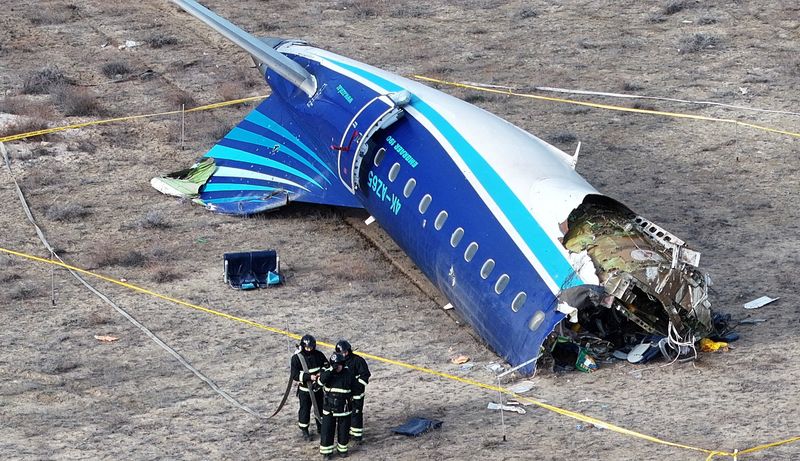Written by Guy Faulconbridge, Andrew Osborne and Nelia Bagirova
MOSCOW/BAKU (Reuters) – Russian President Vladimir Putin apologized to Azerbaijan’s leader on Saturday for what the Kremlin called a “tragic incident” over Russia in which an Azerbaijan Airlines plane crashed after Russian air defenses fired on Ukrainian drones.
The extremely rare public apology from Putin was the closest Moscow has come to accepting some blame for Wednesday’s disaster, although the Kremlin statement did not say Russia shot down the plane, but only indicated a criminal case had been opened.
Flight J2-8243, en route from Baku to the Chechen capital Grozny, made an emergency landing on Wednesday near Aktau in Kazakhstan after being diverted from southern Russia, where Ukrainian drones were reportedly attacking several cities. At least 38 people were killed.
Four sources familiar with the preliminary results of the investigation conducted by Azerbaijan told Reuters on Thursday that Russian air defenses shot down the plane by mistake. Passengers said they heard a loud noise outside the plane.
The Kremlin said that Putin called President Ilham Aliyev and “apologized to him for the tragic accident that occurred in Russian airspace and once again expressed his deep and sincere condolences to the families of the victims and wished a speedy recovery for the wounded.”
He added: “At that time, Grozny, Mozdok and Vladikavkaz were attacked by Ukrainian drones, and Russian air defense systems repelled these attacks.”
The Kremlin said that “civilian and military specialists” were being interrogated.
Ukrainian President Volodymyr Zelensky also said he called Aliyev to offer condolences, and in his statement on the X Russia platform demanded “clear explanations.”
Objects that crashed through the fuselage
For its part, Azerbaijan said that Aliyev informed Putin that the plane “was subjected to external physical and technical interference in Russian airspace, which led to a complete loss of control and redirection to the Kazakh city of Aktau.”
As of Saturday, Russia’s last working day before the long New Year holiday, the Kremlin said it was inappropriate to comment on the incident before official investigations had concluded.
The Embraer plane had taken off from the Azerbaijani capital, Baku, to Grozny in the Chechnya region in southern Russia, where the accident occurred, and then traveled another 280 miles (450 kilometers) across the Caspian Sea, after sustaining severe damage.
Footage taken by passengers before the plane crash showed oxygen masks and people wearing life jackets. Later videos showed bloodied and bruised passengers emerging from the wreckage. There were 29 survivors.
Baku cited injuries caused by objects that penetrated the plane’s fuselage from the outside and testimonies of survivors as evidence of “external physical and technical interference.”
The incident highlighted the dangers to civil aviation even when planes fly hundreds of miles from a war zone, especially when Ukraine deployed drones en masse to try to strike back at Russia behind the front lines.
Russia is using electronic jamming to confuse the geolocation and communications systems of Ukrainian drones, which it also targets with air defense systems.

In 2020, the Iranian Revolutionary Guard mistakenly shot down a Ukrainian airliner, killing all 176 people on board.
In 2014, Malaysia Airlines flight MH17 was shot down over eastern Ukraine, with the loss of 298 passengers and crew, due to what Dutch investigators said was a Russian BUK missile system. Russia denied involvement.
https://i-invdn-com.investing.com/news/news_headline_open_108x81._800x533_L_1419519630.jpg
Source link